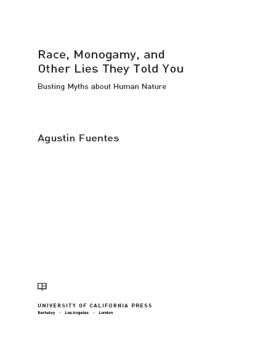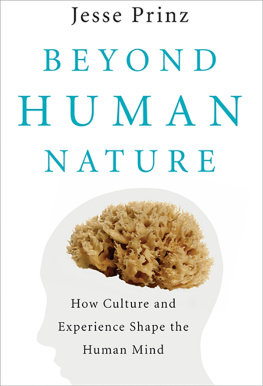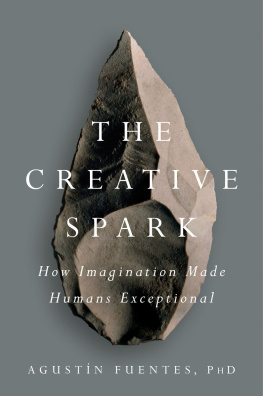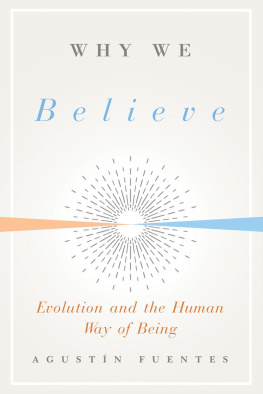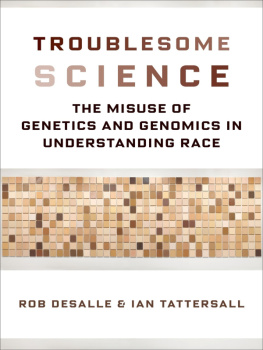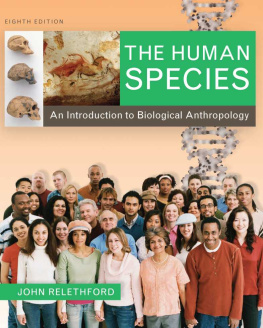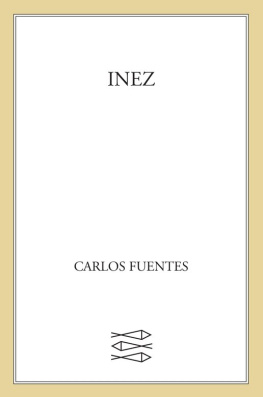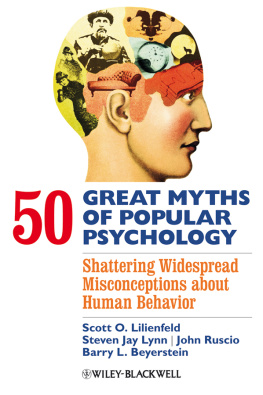Acknowledgments
The researching and writing of this book have taken many years and would not have been possible without the support, assistance, and intellectual contributions of many, many people. I particularly want to thank my amazing colleagues at the University of Notre Dame in the anthropology department and beyond, and my close colleagues in the worlds of anthropology, biology, and psychology. There are too many individuals in these categories to list here, but so many of them deeply influenced my thinking, practice, and research. I also must thank my students over the last seventeen years for pushing me intellectually and pedagogically. Without the insights and engagement of all these people I would not have been able to write this book. I also thank the University of Notre Dame Institute for Scholarship in the Liberal Arts and the Dean of the College of Arts and Letters for specific support on this project.
I am indebted to Blake Edgar (sponsoring editor) for his support and encouragement in the initial development of this book project and for his comments and suggestions throughout, and to the production staff at University of California Press, Rachel Berchten (project editor) and Kate Marshall (associate editor), and to the stellar copyeditor, Kathleen MacDougall, for making the manuscript into a book. I also thank Alexander Trotter for creating the index. The book you are reading was made much better by the excellent critical reviews of earlier versions by Karen Strier, Robert Sussman, and one anonymous reviewer. Specific chapters were greatly enriched by intellectual engagement with Jim McKenna, Katie C. MacKinnon, Nick Malone, Hope Hollocher, John Archer, Susan Blum, Rahul Oka, Mark Hauser (the archeologist), Daniel Lende, Greg Downey, Douglas Fry, Julienne Rutherford, and others, as well as my presentations for the Hesburgh lecture series sponsored by the University of Notre Dame alumni association. Any and all omissions or errors in this book are entirely my fault.
Finally, I thank my family. My parents and their partners, aunts and uncles, all of my siblings, nieces and nephews, parents-in-law, and cousins across the globe for their unabashed support and the ever present discussions on the topics in this book. I especially thank my partner, Devi Snively, for helping me develop these ideas, for partaking in (and putting up with) the life of the academic, and for sharing in, and shaping, my passion for the power of words.
APPENDIX
Getting the Information Yourself
So, you want to bust some popular myths? To effectively bust myths you need curiosity, perseverance, and the ability to collect and assess copious amounts of information. You have to be ready to read a lot, to think critically about what you read, and to be vigilant about popular assertions, whether you agree with them or not. Today it is also critical to have a computer and access to the Internet. The following are a few tips to think about as you consider trying to figure out what the world is actually like.
CHALLENGE COMMON SENSE!
Do not passively accept what you are told. If something strikes you as incorrect, or even if you just want to know if it is right or wrong, you need to do a little legwork to figure out how to assess the assertion. The easiest way to try this is to ask yourself the following questions about something you believe. Why do you believe it? Experience? School? Read it somewhere? Heard it from parents, a friend, a co-worker? First figure out where information comes from, then ask yourself why it feels right or wrong.
Sometimes your gut feeling reflects your schemata, telling you that all is as it should be. But sometimes you might, even subconsciously, have picked up on some of the variation, patterns, or inconsistencies that make you feel differently about this particular topic (whatever it is). This feeling might make you question some assertion of reality that seems clear and correct to others. How do you figure out how to effectively question the assertion? Clarifying what is actually being said and who is saying it is a good place to start. The assertion that boys play rougher than girls it is probably going to sound right, but how does anyone actually know this? If the person making the assertion does not study this then they must have heard it or read it somewhere and are simply repeating it. Or maybe the person making the assertion is going solely on their own life experience. Whatever the case, you need to figure out where the original information comes from (or at least where that person heard it) and start there.
For example, it makes common sense that men and women's brains are different. I challenged this in about male and female brains being so similar, then go and check it out for yourself. Check the notes to see the data and/or publications I am citing to support my points. Read them and see if you agree. Do a little research in libraries or on the Web, ask people, see where this path of inquiry takes you. In the end you might reaffirm your beliefs or maybe they might be challenged.
In this effort it is absolutely necessary that you are not afraid to admit you do not understand. We humans have very large and complex brains and one of their major functions is to help us identify when things just do not make sense to us. Being confused or not following a line of argument is a normal part of brain function, especially when it involves thinking about something that contradicts our normative expectations. Our society makes it difficult to admit we do not understand, but it is a critical first step in learning and in busting myths.
LOTS OF DATA
To integrate information across different areas of knowledge requires two steps. First, how do you get the information, and second, once you have it how can you tell what is most worthwhile and relevant? This can be broken down into three parts: Where do we find the information? How do we select the right information from the vast amount out there? How do we understand details of information in fields/areas that we know little or nothing about?
Where do we find the information? Most people know the answer to this question. Libraries, books, journals, print and visual media, the Internet, real discussions with real people, and professional scientific organizations are a good start. This involves what many folks in the field of education like to call life-long learning, which is the idea that the basic skills of searching for and acquiring information that you learn in school can be applied throughout life to keep enhancing and expanding your knowledge set.
As a baseline I encourage purchasing books (or e-books). The ability to own many, many books and therefore have continuous access to the knowledge they contain is a wonderful luxury of the modern age. The importance and value of reading for training the mind cannot be underestimated. However, when trying to do research in regard to myths of human nature, very few people are going to be able to spend the money to purchase hundreds of books. So I'll focus on the variety of sources that provide low-cost, or free, access to information.
If one has access to a university library this is often the best place to get a wide range of information. Today's university libraries have large holdings of books sorted by subjects, topics, and authors, but more importantly they also now have enormous digital holdings. Whether it is the tens of thousands of electronic PhD dissertations, the Web of science, Promed and other professional search databases, huge digital holdings of academic journals (some dating from the late 1800s), or vast online repositories of datasets, electronic access has become amazingly deep. University libraries are treasure chests of access to information, but not everyone can use them. Public libraries vary dramatically. Some have excellent facilities and others do not. Some have great book holdings and electronic resources and others do not. It is important to see what your local public libraries have and to use them when possible, but they are much more variable in holdings and infrastructure support than are major university libraries.
Next page
